Climate Change and Fish Stocks – Burning Oxygen!
Politics / Climate Change Jun 17, 2018 - 01:49 PM GMTBy: Richard_Mills
 University of British Columbia students combed through studies of fish in the North Sea. Their results were surprising - some species are getting smaller due to warmer waters. That causes lower oxygen concentrations in the water, resulting in fish burning energy faster. Larger fish species can’t get enough oxygen to keep up with the higher metabolism, meaning they mature at a smaller size, explained Science magazine.
University of British Columbia students combed through studies of fish in the North Sea. Their results were surprising - some species are getting smaller due to warmer waters. That causes lower oxygen concentrations in the water, resulting in fish burning energy faster. Larger fish species can’t get enough oxygen to keep up with the higher metabolism, meaning they mature at a smaller size, explained Science magazine.
A story in IRIN, a blog about environmental and other crises, describes the “perfect storm” that is occurring in the oceans due to overfishing and climate change. The result could mean a dramatic decline in fish stocks, with the most serious affect being malnutrition in poor countries in tropical climates that depend on fishing as a protein staple.
NEARLY 3 BILLION PEOPLE RELY ON FISH AS A MAJOR SOURCE OF PROTEIN. OVERALL, FISHERIES AND AQUACULTURE ASSURE THE LIVELIHOODS OF 10–12 PER CENT OF THE WORLD’S POPULATION. 60 PER CENT OF THE WORLD’S POPULATION LIVES WITHIN 100KM OF THE COAST. MARINE VERTEBRATE POPULATIONS DECLINED 49 PER CENT BETWEEN 1970 AND 2012. POPULATIONS OF FISH SPECIES UTILIZED BY HUMANS HAVE FALLEN BY HALF, WITH SOME OF THE MOST IMPORTANT SPECIES EXPERIENCING EVEN GREATER DECLINES.
[A] report published [in 2016] by the International Union for Conservation of Nature and Natural Resources] says a “truly staggering” rise in temperature has caused chaos in the seas: dangerous microbes and cholera-carrying bacteria are breeding in warmer waters, along with toxic algae, which could poison fish and humans that eat them; coral reefs that provide the habitat for a quarter of the world’s marine species are dying; species including turtles, seabirds, and fish are being driven into cooler waters towards the poles. – IRIN
Black sea bass, once abundant in North Carolina, have moved north to New England. NOAA NATIONAL OCEAN SERVICE
The report says that in 2015 ocean temperatures were the warmest in 136 years. The Worldwatch Institute notes over the last 40 years the upper 75 meters of the oceans have increased by over 0.1 degrees Celsius per year. That doesn’t sound like a lot, but warmer temperatures and overfishing are pushing temperate species towards the poles where they face greater competition for food with polar animals.
Warmer ocean temperatures also cause acidification, which stunts the growth of corals and shell-based creatures like oysters. The destruction of coral reefs is a major problem resulting from climate change, since they provide critical habitat and food for so many species in the reef ecosystem.
IF CURRENT RATES OF TEMPERATURE RISE CONTINUE, THE OCEAN WILL BECOME TOO WARM FOR CORAL REEFS BY 2050.
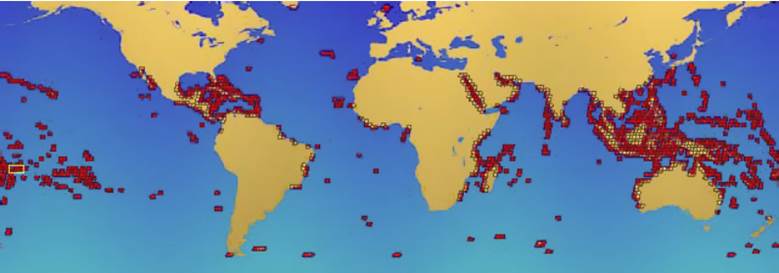
World’s coral reefs, NASA
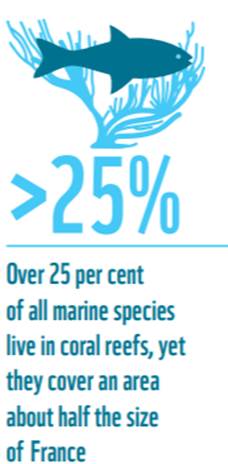 World fisheries are in a state of collapse – caught between plagues of jellyfish, overfishing, nutrient pollution, bioaccumulation of toxics in marine mammals, carbon emissions turning our oceans acidic, the oceans phytoplankton declining by about 40 per cent over the past century, dead zones, garbage patch’s, increasing ocean temperatures and changing currents - our entire marine food chain seems to be in peril.
World fisheries are in a state of collapse – caught between plagues of jellyfish, overfishing, nutrient pollution, bioaccumulation of toxics in marine mammals, carbon emissions turning our oceans acidic, the oceans phytoplankton declining by about 40 per cent over the past century, dead zones, garbage patch’s, increasing ocean temperatures and changing currents - our entire marine food chain seems to be in peril.
Populations of jellyfish are exploding around the globe. They feed on the same kinds of prey as fish so if fish numbers are depleted jellyfish fill the gap.
Overfishing isn't the only explanation for exploding jellyfish populations.
An ocean dead zone is an area of the ocean that’s hypoxic, which means that it has low oxygen. The reasons for ocean dead zones are most commonly attributed to toxic chemicals and human waste (eutrophication - high levels of nutrients), infiltrating the water near coastlines. The low oxygen levels created favor jellyfish as they can thrive in oxygen depleted water whereas fish can’t.
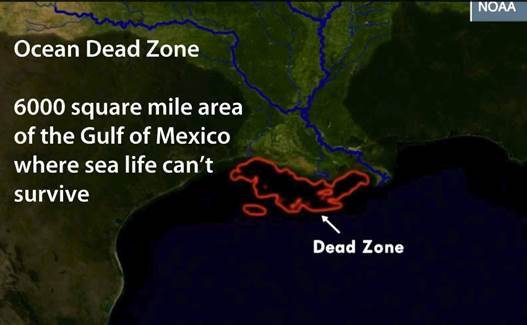
Oceanographers first began noticing ocean dead zones in the 1970s, and
instances of dead zones have been increasing ever since - a tenfold global increase over the last 40 years. Large lakes can also have dead zones.
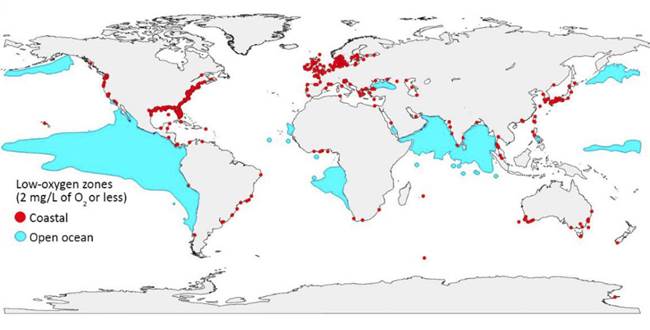
Phytoplankton are microscopic single cell plant organisms and are the most abundant vegetation in the ocean - they drift in the ocean currents and occupy most of the surface area of the earth's oceans. They are the first, the bottom link, in the oceanic food chain - they are the crucial nutrient at the base of the food chain on which all marine life depends.
They are eaten by zooplankton (microscopic animal organisms) which are eaten by other animals, which are then consumed by other animals higher up the food chain.
Temperatures on the surface of our oceans are rising - the result is a reduction in the numbers of phytoplankton. Since 1950, phytoplankton numbers have declined globally by about 40 percent. Experts are already warning us that because of overfishing the world's fisheries could collapse by 2050 - the decline in phytoplankton could make the situation even worse.
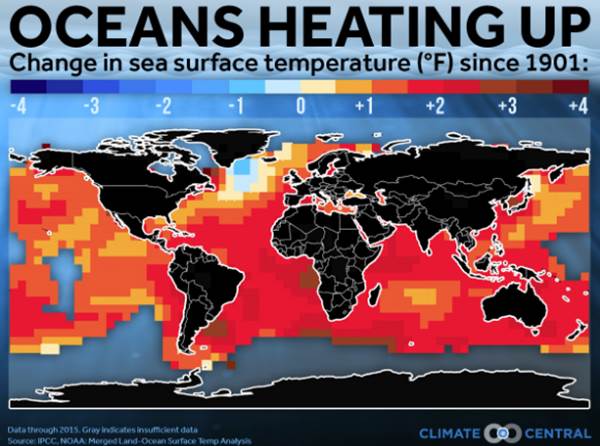
Half of the oxygen produced by plants comes from phytoplankton. They are vital in maintaining the earth’s atmosphere and the oxygen we need to survive. For a long time there has been an extremely small, but constant, decline in the oxygen content of our atmosphere. It's possible that the loss of phytoplankton could be a factor. Phytoplankton also absorb a huge amount of carbon dioxide each year.
Ocean acidification is the name given to the ongoing decrease in the pH of the Earth's oceans. CO2 dissolving in seawater increases the hydrogen ion concentration in the ocean, thus decreasing ocean pH. Between 1751 and 1994 the ocean surface pH is estimated to have decreased from approximately 8.25 to 8.14 - an acidity increase of roughly 30%.
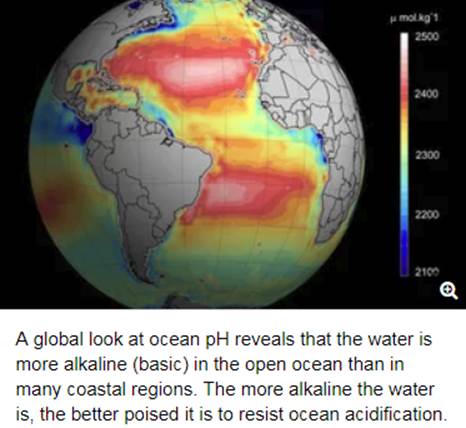
Livescience.com
“Ocean acidification only really came to the fore about five years ago…As acidity and sea temperature increase, the ocean’s ability to absorb atmospheric CO2 will be reduced…this could trigger a chain reaction that reverberates throughout the marine food web … starting with vulnerable species such as larval fish and shell fish, and ending with detrimental effects to the global fishing industry and the food security of many of the world’s poorest people.” Professor Dan Laffoley, co-editor ‘Ocean Acidification: The Facts’
The powerful ocean current system creates a flow of warm surface water, the Gulf Stream, from the Caribbean northwards.
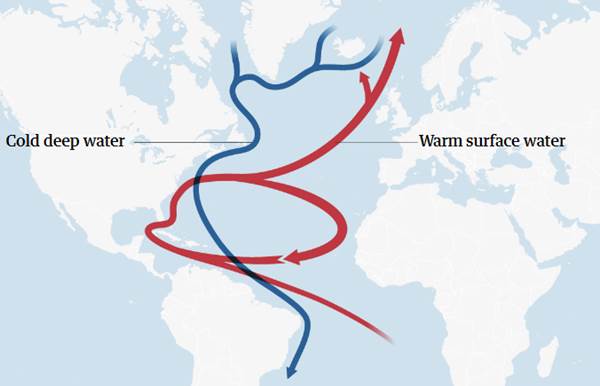
A branch of the Gulf Stream, the North Atlantic Drift, transports warm water into the north Atlantic. As it travels to the Arctic the warm water heats the countries of the North Atlantic. As the water gets further and further north it cools, which increases its density. The dense water sinks to the bottom of the ocean where it is carried back to the equator.
Research has found that the influence of the cold water Labrador Current on the Gulf Stream has been decreasing continually since the 1970s. In May 2005, researchers reported the results of an investigation measuring the giant chimneys of cold dense water by which the water normally sinks down to the sea bed. They found the chimneys have virtually disappeared. Usually there are seven to twelve giant columns, but they found only two giant columns, both extremely weak.
A Gulf Stream shutdown or a slowdown could have major consequences regarding fish stocks:
- A collapse of plankton stocks
- An oceanic anoxic event - oxygen below surface levels of the stagnant oceans becomes depleted
While not directly linked to climate change, the amount of plastic in the oceans is another serious threat to marine species. Plastic is the most prevalent type of garbage found in the sea, and much of it gets reduced to microscopic particles that are digested by fish and can even end up at the top of the food chain, in humans. According to Ocean Conservancy, a non-profit group, plastic debris comprise about 85% of the garbage found on beaches, in waterways and oceans. That’s 19 billion pounds of plastic garbage - enough to cover an area 34 times the size of Manhattan, ankle deep.
Fact Sheet: Plastics in the Ocean
This isn’t even counting the debris we can’t see. The sun breaks down plastic into extremely small pieces, some no larger than seeds, which are a threat to at least 600 wildlife species says Ocean Conservancy. These includes leatherback turtles, whales, and seabirds. The Huffington Post quotes one study that said one quarter of fish bought from fish markets in Indonesia and the US had plastic in their guts. Microplastics have been found in the digestive tracts of oysters, mussels and lobsters.
Conclusion
“The cod fishery, the herring fishery, the pilchard fishery, the mackerel fishery, and probably all the great sea fisheries, are inexhaustible. That is to say, that nothing we do seriously affects the number of the fish.” Thomas Henry Huxley at a fisheries exhibition in London in 1883
Ahead of the Herd is putting together a series of articles on climate change. We plan to cover the whole range of global warming causes and effects. Each article will endeavor to explain a facet of climate science that is not only extremely interesting, but also has investment implications. Look for the articles on Fridays and in our weekly Ahead of the Herd newsletter which is sent out each Saturday morning.
Our changing climate - Part 1
Birds, bees and bugs: going going gone - Part 2
Gone Fishing – Part 3
The day they turned off the taps – Part 4
Climate change is already impacting you and the consequences you feel are going to intensify and multiply. Are going going gone birds, bees, bugs and fish (and turtles, sharks, frogs etc etc etc) on your radar screen?
By Richard (Rick) Mills
If you're interested in learning more about the junior resource and bio-med sectors please come and visit us at www.aheadoftheherd.com
Site membership is free. No credit card or personal information is asked for.
Richard is host of Aheadoftheherd.com and invests in the junior resource sector.
His articles have been published on over 400 websites, including: Wall Street Journal, Market Oracle, USAToday, National Post, Stockhouse, Lewrockwell, Pinnacledigest, Uranium Miner, Beforeitsnews, SeekingAlpha, MontrealGazette, Casey Research, 24hgold, Vancouver Sun, CBSnews, SilverBearCafe, Infomine, Huffington Post, Mineweb, 321Gold, Kitco, Gold-Eagle, The Gold/Energy Reports, Calgary Herald, Resource Investor, Mining.com, Forbes, FNArena, Uraniumseek, Financial Sense, Goldseek, Dallasnews, Vantagewire, Resourceclips and the Association of Mining Analysts.
Copyright © 2018 Richard (Rick) Mills - All Rights Reserved
Legal Notice / Disclaimer: This document is not and should not be construed as an offer to sell or the solicitation of an offer to purchase or subscribe for any investment. Richard Mills has based this document on information obtained from sources he believes to be reliable but which has not been independently verified; Richard Mills makes no guarantee, representation or warranty and accepts no responsibility or liability as to its accuracy or completeness. Expressions of opinion are those of Richard Mills only and are subject to change without notice. Richard Mills assumes no warranty, liability or guarantee for the current relevance, correctness or completeness of any information provided within this Report and will not be held liable for the consequence of reliance upon any opinion or statement contained herein or any omission. Furthermore, I, Richard Mills, assume no liability for any direct or indirect loss or damage or, in particular, for lost profit, which you may incur as a result of the use and existence of the information provided within this Report.
© 2005-2022 http://www.MarketOracle.co.uk - The Market Oracle is a FREE Daily Financial Markets Analysis & Forecasting online publication.



